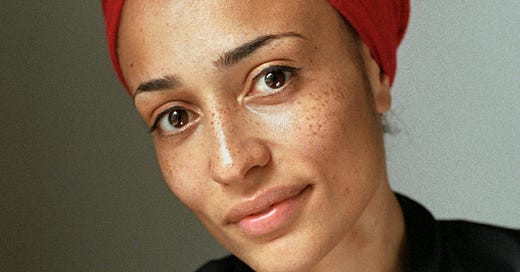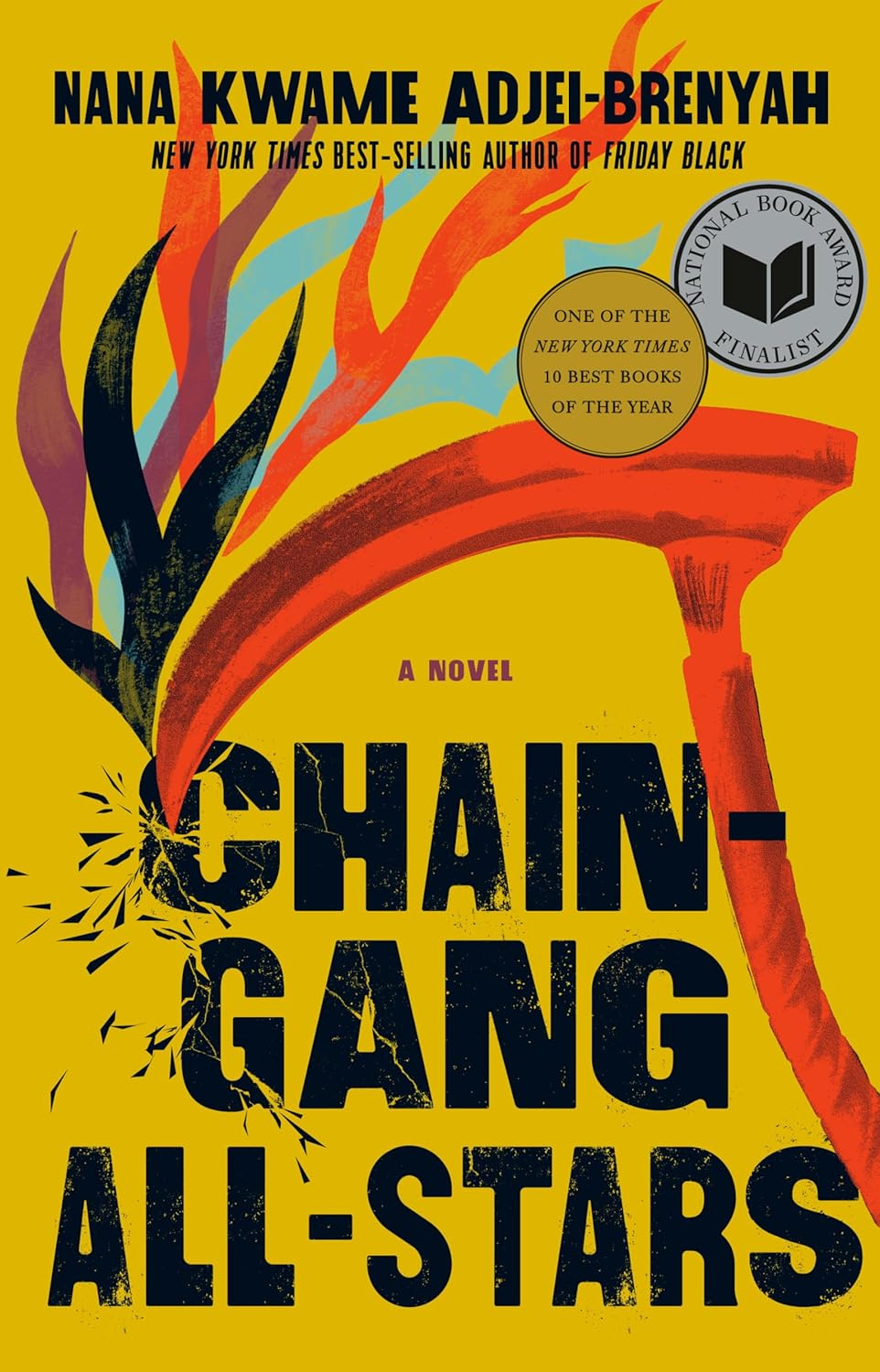Zadie Smith
[photo by Dominique Nabokov]
Sixes [1]: https://longd.substack.com/p/sixes-1
Before we get to today’s Sixes, here are a dozen other first novels—they demonstrate the fact that some novice writers fail miserably at the business of laboring in abject obscurity.
Conversations With Friends, Sally Rooney (2017)
The Martian, Andy Weir (2011)
The Namesake, Jhumpa Lahiri (2003)
White Teeth, Zadie Smith (2000)
The Fight Club, Chuck Palahniuk (1996)
The Joy Luck Club, Amy Tan (1986)
One Flew Over the Cuckoo’s Nest, Ken Kesey (1962)
To Kill a Mockingbird, Harper Lee (1960)
The Catcher in the Rye, J.D. Salinger (1951)
Native Son, Richard Wright (1940)
The Hobbit, J.R.R. Tolkien (1937)
Wuthering Heights, Emily Brontë (1847)
Sense and Sensibility, Jane Austen (1811)
And another dozen, plucked from this site’s first year of posts:
Lungfish, Meghan Gilliss (2022)1
The Raw Shark Texts, Steven Hall (2007)2
Perma Red, Debra Magpie Earling (2002)
The Perks of Being a Wallflower, Stephen Chbosky (1999)
Tipping the Velvet, Sara Waters (1998)
The Virgin Suicides, Jeffrey Eugenides (1993)
In Shelley’s Leg, Sara Vogan (1981)
The Bluest Eye, Toni Morrison (1970)3
Three Trapped Tigers, Guillermo Cabrera Infante (1967)4
Mrs. Bridge, Evan S. Connell (1959)5
Cold Comfort Farm, Stella Gibbons (1932)
SIXES [2]: AN ECLECTIC HANDFUL OF FIRST NOVELS
Chain-Gang All-Stars, Nana Kwame Adjei-Brenyah (2023)6
American War, Omar El Akkad (2017)7
Eileen, Ottessa Moshfegh (2015)8
If Nobody Speaks Of Remarkable Things, Jon McGregor (2002)9
Angels, Denis Johnson (1983)10
Failure To Zigzag, Jane Vandenburgh (1989)11
Desert of the Heart, Jane Rule (1964)12
A few links:
https://blog.kotobee.com/30-famous-authors-debuts/
https://lithub.com/the-10-best-debut-novels-of-the-decade/
https://lithub.com/10-debut-novels-nobody-reads-anymore-but-should/
https://www.bookpage.com/features/26705-24-best-debuts-2000s-fiction/
Lungfish: I discovered this one while prepping the post on fiction from small presses: [Small Press Report [1]. A New York Times Book Review Editors’ Choice, longlisted for The Center for Fiction 2022 First Novel Prize. A family squatting on an island off the coast of Maine. From a review:
Relying on the island for sustenance and answers—bladderwrack, rosehips, tenacious little green crabs; smells held by the damp walls of the house, field guides and religious texts, a failed invention left behind by her missing father—Tuck lives moment-by-moment through the absurdity, beauty, paranoia, and hunger that shoots through her life, as her husband struggles to detox. Exquisitely written and formally daring . . . Meghan Gilliss’s debut is a brilliant and heartbreaking novel about addiction, doubt, marriage, motherhood, and learning to see in the dark.
[Oddly, I just read another book set on an island off the coast of Maine: Paul Harding’s third novel, This Other Eden (2023).]
Raw Shark:
https://groveatlantic.com/book/the-raw-shark-texts/Bluest Eye: The only Morrison novel I’ve never read. Why? (Scratches head.) I have to give the same answer my friend Ed did back when he was a vegetarian—we were at a Mariner’s game and I’d gotten myself a chili dog; Ed disappeared for a bit and came back with his own chili dog. Ed, I said, how come you’re eating a chili dog? He looked at me blankly for a long moment, finally said, I have no answer for that.
Infante: Iconoclastic Cuban writer. Tres tristes tigres is “a highly experimental, Joycean novel, playful and rich in literary allusions, which intended to do for Cuban Spanish what Mark Twain had done for American English.” The title itself is a Spanish-language tongue-twister. Putting this on my Have a Look list.
Mrs. Bridge: Really, you should read this.
Chain-Gang: This appears to be quite the wild ride. Has appeared on various top-ten lists.
https://en.wikipedia.org/wiki/Chain-Gang_All-StarsAmerican War: About the next American Civil War. Very well-reviewed. This one got under my skin . . . I wish it were less possible-seeming. As with many theme-oriented novels, the scenario grabs you and gives the story gravitas, but the avidness of your reading comes from an extraordinary character at the center.
Moshfegh: Eileen is considered her debut novel, but, for the record, the previous year (2014) she published a novella called McGlue. More on that in a second. When I first read Eileen I knew nothing about Moshfegh, but realized at once she was the real deal. The novel is narrated by Eileen, but many years after the time of the story—she has no trouble judging the drab, deeply unhappy young woman she was. It’s a dark book and Eileen is not a likeable character, which makes the novel a dive with a high degree of difficulty. Moshfegh nails it by virtue of the voice, its raw candor, its refusal to sweeten the story.
[Side note: I wrote about my love for another Mossfegh novel, My Year of Rest and Relaxation (2018) in an earlier post: Reading Projects [2]: Guilty Pleasures.]
Now then, McGlue:
Wiki: In 1851, McGlue, an American sailor, wakes up to find himself chained down in the hold of the boat he works on. He is too drunk to remember what happened, but everyone is saying he murdered his shipmate, Johnson. This doesn't make sense to McGlue, who considered Johnson his friend, and has no memory of killing him.
Los Angeles Review of Books: . . . reads like the swashbuckled spray of a slit throat—immediate, visceral, frank, unforgiving, violent, and grotesquely beautiful.
Novelist Brian Evenson: . . . written in a style at once intoxicating and intoxicated, McGlue is a fierce and sodden historical novel that pulls nary a punch.
McGregor: A Bermuda-born Brit the same age as my older son (48)—a writer to watch. I quoted a passage of this novel in an essay on the power of objects in fiction; I think it gives you the flavor of the prose. A couple marries in a rush before the new-husband has to go off to the war:
And they took the wedding certificate back to their new house, propped it up on the chest of drawers at the foot of the bed, and spent the whole evening looking at it, both feeling as if they’d just stepped off a fairground ride, both feeling dizzy and exhilarated, struggling to get their breath back, struggling to absorb everything that had happened.
In 2017, he published a short novel about a girl gone missing on the moors, Reservoir 13, then a companion volume, The Reservoir Tapes. Followed, in 2021, by Lean Fall Stand, a intense short novel in which a veteran Antarctic surveyor loses his ability to speak, leaving him unable to explain the catastrophe that befell the team.
Denis Johnson: I still can’t believe he’s dead (liver cancer, 2017).
Sometimes a writer will publish a book that eclipses their others—for fellow writers, especially, that’s true of Jesus’ Son (1992), labeled a book of stories, but to my mind (considering the fluidity of the term) it qualifies as a novel fully as much as other “novels of linked stories”—Love Medicine (Louise Erdrich, 1984), for instance, Alice Munro’s The Beggar Maid (1978), Tim O’Brien’s The Things They Carried (1990) or Elizabeth Strout’s Olive Kittredge (2008). The quirky brilliance of Jesus’ Son, makes us forget that Johnson wrote eleven other books of fiction. Prepping this post I ran into several fierce recommendations for Angels, so I’ll offer it here and put it in my own queue.
Vandenburgh: A daughter amid an abjectly crazy family in the Southern California of the 1960s. Haven’t read this one yet myself, but it seems to have lots of fans. A reviewer:
Charlotte figures, whether it's "nature" or "nurture," she's doomed. In Failure to Zigzag, Jane Vandenburgh gracefully zigzags between hilarity and sorrow as she recounts Charlotte's attempts to grow up and to practice "sanity as a form of revenge."
Rule: Here’s my original note for Desert of the Heart [in Birth year Project: 1964]:
. . . a Canadian-American writer of lesbian-themed works. Her first novel appeared in 1964, when gay activity was still a criminal offense. It turned Rule into a reluctant media celebrity, and brought her massive correspondence from women who had never dared explore lesbianism. Rule became an active anti-censorship campaigner, and served on the executive of the Writers' Union of Canada.
See also: https://www.thecanadianencyclopedia.ca/en/article/jane-vance-rule








Thanks for this list! A debut novel is one of the prompts for the summer reading challenge I’m participating in.
I am sad you have never read The Bluest Eye. The story and the story of the story are both wonderful. I taught that novel for more than twenty years. The first time I taught it because I'd shared a passage in class and students insisted I photocopy it*. Absolute violation of copyright, but then we ordered class sets the next year. It remains a funny-terrible novel that was the one reading students would most often come back to thank me for assigning. [*Four students bought the book the first weekend after we began reading, and that was a non-college track class.]